- By theme
- Jesus
- The many proofs of Christ’s resurrection
- Saint Thomas Aquinas: God gave all the divine proofs we needed to believe
- The surpassing power of Christ's word
- Lewis’s trilemma: a proof of Jesus’s divinity
- God saves: the power of the holy name of Jesus
- Jesus spoke and acted as God's equal
- Jesus' divinity is actually implied in the Koran
- Jesus came at the perfect time of history
- Rabbinical sources testify to Jesus' miracles
- Mary
- The Church
- The Bible
- The authors of the Gospels were either eyewitnesses or close contacts of those eyewitnesses
- Onomastics support the historical reliability of the Gospels
- The New Testament was not altered
- The New Testament is the best-attested manuscript of Antiquity
- The Gospels were written too early after the facts to be legends
- Archaeological finds confirm the reliability of the New Testament
- The criterion of embarrassment proves that the Gospels tell the truth
- The dissimilarity criterion strengthens the case for the historical reliability of the Gospels
- 84 details in Acts verified by historical and archaeological sources
- The unique prophecies that announced the Messiah
- The time of the coming of the Messiah was accurately prophesied
- The prophet Isaiah's ultra accurate description of the Messiah's sufferings
- Daniel's "Son of Man" is a portrait of Christ
- The Apostles
- The martyrs
- The protomartyr Saint Stephen (d. 31)
- Polycarp, bishop of Smyrna, disciple of John and martyr (d. 155)
- Saint Blandina and the Martyrs of Lyon: the fortitude of faith (177 AD)
- Saint Agatha stops a volcano from destroying the city of Catania (d. 251)
- Saint Lucy of Syracuse, virgin and martyr for Christ (d. 304)
- Thomas More: “The king’s good servant, but God’s first”
- The martyrdom of Paul Miki and his companions (d. 1597)
- The martyrs of Angers and Avrillé (1794)
- The Martyrs of Compiègne (1794)
- The Vietnamese martyrs Father Andrew Dung-Lac and his 116 companions (17th-19th centuries)
- He braved torture to atone for his apostasy (d. 1818)
- Blaise Marmoiton: the epic journey of a missionary to New Caledonia (d. 1847)
- José Luis Sanchez del Rio, martyred at age 14 for Christ the King (d. 1928)
- Saint Maximilian Kolbe, Knight of the Immaculate (d. 1941)
- The monks
- Saint Anthony of the Desert, a father of monasticism (d. 356)
- Saint Benedict, father of Western monasticism (d. 550)
- Saint Bruno the Carthusian (d.1101): the miracle of a hidden life
- Blessed Angelo Agostini Mazzinghi: the Carmelite with flowers pouring from his mouth (d. 1438)
- Monk Abel of Valaam's accurate prophecies about Russia (d. 1841)
- The more than 33,000 miracles of Saint Charbel Maklouf (d. 1898)
- Saint Pio of Pietrelcina (d. 1968): How God worked wonders through "a poor brother who prays"
- The surprising death of Father Emmanuel de Floris (d. 1992)
- The prophecies of Saint Paisios of Mount Athos (d. 1994)
- The saints
- Saints Anne and Joachim, parents of the Virgin Mary (19 BC)
- Saint Nazarius, apostle and martyr (d. 68 or 70)
- Ignatius of Antioch: successor of the apostles and witness to the Gospel (d. 117)
- Saint Gregory the Miracle-Worker (d. 270)
- Saint Martin of Tours: patron saint of France, father of monasticism in Gaul, and the first great leader of Western monasticism (d. 397)
- Saint Lupus, the bishop who saved his city from the Huns (d. 623)
- Saint Dominic of Guzman (d.1221): an athlete of the faith
- Saint Francis, the poor man of Assisi (d. 1226)
- Saint Anthony of Padua: "everyone’s saint"
- Saint Rose of Viterbo or How prayer can transform the world (d. 1252)
- Saint Simon Stock receives the scapular of Mount Carmel from the hands of the Virgin Mary
- The unusual boat of Saint Basil of Ryazan
- Saint Agnes of Montepulciano's complete God-confidence (d. 1317)
- The extraordinary conversion of Michelina of Pesaro
- Saint Peter Thomas (d. 1366): a steadfast trust in the Virgin Mary
- Saint Rita of Cascia: hoping against all hope
- Saint Catherine of Genoa and the Fire of God's love (d. 1510)
- Saint Anthony Mary Zaccaria, physician of bodies and souls (d. 1539)
- Saint Ignatius of Loyola (d. 1556): "For the greater glory of God"
- Brother Alphonsus Rodríguez, SJ: the "holy porter" (d. 1617)
- Martin de Porres returns to speed up his beatification (d. 1639)
- Virginia Centurione Bracelli: When God is the only goal, all difficulties are overcome (d.1651)
- Seraphim of Sarov (1759-1833): the purpose of the Christian life is to acquire the Holy Spirit
- Bernadette Soubirous, the shepherdess who saw the Virgin Mary (1858)
- Saint John Vianney (d. 1859): the global fame of a humble village priest
- Gabriel of Our Lady of Sorrows, the "Gardener of the Blessed Virgin" (d. 1862)
- Father Gerin, the holy priest of Grenoble (1863)
- Blessed Francisco Palau y Quer: a lover of the Church (d. 1872)
- Saints Louis and Zelie Martin, the parents of Saint Therese of Lisieux (d. 1894 and 1877)
- The supernatural maturity of Francisco Marto, “contemplative consoler of God” (d. 1919)
- Saint Faustina, apostle of the Divine Mercy (d. 1938)
- Brother Marcel Van (d.19659): a "star has risen in the East"
- Doctors
- The mystics
- Lutgardis of Tongeren and the devotion to the Sacred Heart
- Saint Angela of Foligno (d. 1309) and "Lady Poverty"
- Saint John of the Cross: mystic, reformer, poet, and universal psychologist (+1591)
- Blessed Anne of Jesus: a Carmelite nun with mystical gifts (d.1621)
- Catherine Daniélou: a mystical bride of Christ in Brittany
- Saint Margaret Mary sees the "Heart that so loved mankind"
- Mother Yvonne-Aimée of Jesus' predictions concerning the Second World War (1922)
- Sister Josefa Menendez, apostle of divine mercy (d. 1923)
- Edith Royer (d. 1924) and the Sacred Heart Basilica of Montmartre
- Rozalia Celak, a mystic with a very special mission (d. 1944)
- Visionaries
- Saint Perpetua delivers her brother from Purgatory (203)
- María de Jesús de Ágreda, abbess and friend of the King of Spain
- Discovery of the Virgin Mary's house in Ephesus (1891)
- Sister Benigna Consolata: the "Little Secretary of Merciful Love" (d. 1916)
- Maria Valtorta's visions match data from the Israel Meteorological Service (1943)
- Berthe Petit's prophecies about the two world wars (d. 1943)
- Maria Valtorta saw only one pyramid at Giza in her visions... and she was right! (1944)
- The 700 extraordinary visions of the Gospel received by Maria Valtorta (d. 1961)
- The amazing geological accuracy of Maria Valtorta's writings (d. 1961)
- Maria Valtorta's astronomic observations consistent with her dating system
- Discovery of an ancient princely house in Jerusalem, previously revealed to a mystic (d. 1961)
- The popes
- The great witnesses of the faith
- Saint Augustine's conversion: "Why not this very hour make an end to my uncleanness?" (386)
- Thomas Cajetan (d. 1534): a life in service of the truth
- Madame Acarie, "the servant of the servants of God" (d. 1618)
- Blaise Pascal (d.1662): Biblical prophecies are evidence
- Jacinta, 10, offers her suffering to save souls from hell (d. 1920)
- Father Jean-Édouard Lamy: "another Curé of Ars" (d. 1931)
- Christian civilisation
- The depth of Christian spirituality
- John of the Cross' Path to perfect union with God based on his own experience
- The dogma of the Trinity: an increasingly better understood truth
- The incoherent arguments against Christianity
- The "New Pentecost": modern day, spectacular outpouring of the Holy Spirit
- The Christian faith explains the diversity of religions
- Cardinal Pierre de Bérulle (d.1629) on the mystery of the Incarnation
- Christ's interventions in history
- Marian apparitions and interventions
- The Life-giving Font of Constantinople
- Our Lady of Virtues saves the city of Rennes in Bretagne (1357)
- Mary stops the plague epidemic at Mount Berico (1426)
- Cotignac: the first apparitions of the Modern Era (1519)
- Savona: supernatural origin of the devotion to Our Lady of Mercy (1536)
- The Virgin Mary delivers besieged Christians in Cusco, Peru
- The victory of Lepanto and the feast of Our Lady of the Rosary (1571)
- The apparitions to Brother Fiacre (1637)
- The “aldermen's vow”, or the Marian devotion of the people of Lyon (1643)
- Our Lady of Nazareth in Plancoët, Brittany (1644)
- Our Lady of Laghet (1652)
- Saint Joseph’s apparitions in Cotignac, France (1660)
- Heaven confides in a shepherdess of Le Laus (1664-1718)
- Zeitoun, a two-year miracle (1968-1970)
- The Holy Name of Mary and the major victory of Vienna (1683)
- Heaven and earth meet in Colombia: the Las Lajas shrine (1754)
- "Consecrate your parish to the Immaculate Heart of Mary" (1836)
- At La Salette, Mary wept in front of the shepherds (1846)
- Our Lady of Champion, Wisconsin: the first and only approved apparition of Mary in the US (1859)
- Gietrzwald apparitions: heavenly help to a persecuted minority
- The silent apparition of Knock Mhuire in Ireland (1879)
- Mary "Abandoned Mother" appears in a working-class district of Lyon, France (1882)
- The thirty-three apparitions of the Virgin Mary in Beauraing (1932)
- "Our Lady of the Poor" appears eight times in Banneux (1933)
- Fontanelle-Montichiari apparitions of Our Lady "Rosa Mystica" (1947)
- Zeitoun apparitions
- The Virgin Mary comes to France's rescue by appearing at L'Ile Bouchard (1947)
- Maria Esperanza Bianchini and Mary, Mary, Reconciler of Peoples and Nations (1976)
- Luz Amparo and the El Escorial apparitions
- The extraordinary apparitions of Medjugorje and their worldwide impact
- The Virgin Mary prophesied the 1994 Rwandan genocide (1981)
- Our Lady of Soufanieh's apparition and messages to Myrna Nazzour (1982)
- The Virgin Mary heals a teenager, then appears to him dozens of times (1986)
- Seuca, Romania: apparitions and pleas of the Virgin Mary, "Queen of Light" (1995)
- Angels and their manifestations
- Mont Saint-Michel: Heaven watching over France
- Angels give a supernatural belt to the chaste Thomas Aquinas (1243)
- The constant presence of demons and angels in the life of St Frances of Rome (d. 1440)
- Mother Yvonne-Aimée escapes from prison with the help of an angel (1943)
- Saved by Angels: The Miracle on Highway 6 (2008)
- Exorcisms in the name of Christ
- A wave of charity unique in the world
- Saint Angela Merici: Christ came to serve, not to be served (d. 1540)
- Saint John of God: a life dedicated to the care of the poor, sick and those with mental disorders (d. 1550)
- Saint Camillus de Lellis, reformer of hospital care (c. 1560)
- Blessed Alix Le Clerc, encouraged by the Virgin Mary to found schools (d. 1622)
- Saint Vincent de Paul (d. 1660), apostle of charity
- Marguerite Bourgeoys, Montreal's first teacher (d. 1700)
- Frédéric Ozanam, inventor of the Church's social doctrine (d. 1853)
- Damian of Molokai: a leper for Christ (d. 1889)
- Pier Giorgio Frassati (d.1925): heroic charity
- Saint Dulce of the Poor, the Good Angel of Bahia (d. 1992)
- Mother Teresa of Calcutta (d. 1997): an unshakeable faith
- Heidi Baker: Bringing God's love to the poor and forgotten of the world
- Amazing miracles
- The miracles of Saint Anthony of Padua (d. 1231)
- Saint Philip Neri calls a teenager back to life (1583)
- Saint Francis de Sales brings back to life a victim of drowning (1623)
- Saint John Bosco and the promise kept beyond the grave (1839)
- The day the sun danced at Fatima (1917)
- Pius XII and the miracle of the sun at the Vatican (1950)
- When Blessed Charles de Foucauld saved a young carpenter named Charle (2016)
- Reinhard Bonnke: 89 million conversions (d. 2019)
- Miraculous cures
- The royal touch: the divine thaumaturgic gift granted to French and English monarchs (11th-19th centuries)
- With 7,500 cases of unexplained cures, Lourdes is unique in the world (1858-today)
- Our Lady at Pellevoisin: "I am all merciful" (1876)
- Mariam, the "little thing of Jesus": a saint from East to West (d.1878)
- Gemma Galgani: healed to atone for sinners' faults (d. 1903)
- The miraculous cure of Blessed Maria Giuseppina Catanea
- The extraordinary healing of Alice Benlian in the Church of the Holy Cross in Damascus (1983)
- The approved miracle for the canonization of Juan Diego Cuauhtlatoatzin (1990)
- Healed by St Charbel Makhlouf, her scars bleed each month for the benefit of unbelievers (1993)
- The miracle that led to Brother André's canonisation (1999)
- Bruce Van Natta's intestinal regrowth: an irrefutable miracle (2007)
- Manouchak, operated on by Saint Charbel (2016)
- How Maya was cured from cancer at Saint Charbel's tomb (2018)
- Preserved bodies of the saints
- Dying in the odour of sanctity
- The body of Saint Cecilia found incorrupt (d. 230)
- Stanislaus Kostka's burning love for God (d. 1568)
- Blessed Antonio Franco, bishop and defender of the poor (d. 1626)
- The incorrupt body of Marie-Louise Nerbollier, the visionary from Diémoz (d. 1910)
- The great exhumation of Saint Charbel (1950)
- Bilocations
- Inedias
- Levitations
- Lacrimations and miraculous images
- Saint Juan Diego's tilma (1531)
- The Rue du Bac apparitions of the Virgin Mary to St. Catherine Labouré (Paris, 1830)
- Mary weeps in Syracuse (1953)
- Teresa Musco (d.1976): salvation through the Cross
- Soufanieh: A flow of oil from an image of the Virgin Mary, and oozing of oil from the face and hands of Myrna Nazzour (1982)
- The Saidnaya icon exudes a wonderful fragrance (1988)
- Our Lady weeps in a bishop's hands (1995)
- Stigmates
- The venerable Lukarda of Oberweimar shares her spiritual riches with her convent (d. 1309)
- Blessed Maria Grazia Tarallo, mystic and stigmatist (d. 1912)
- Saint Padre Pio: crucified by Love (1918)
- Elena Aiello: "a Eucharistic soul"
- A Holy Triduum with a Syrian mystic, witnessing the sufferings of Christ (1987)
- A Holy Thursday in Soufanieh (2004)
- Eucharistic miracles
- Lanciano: the first and possibly the greatest Eucharistic miracle (750)
- A host came to her: 11-year-old Imelda received Communion and died in ecstasy (1333)
- Faverney's hosts miraculously saved from fire
- A tsunami recedes before the Blessed Sacrament (1906)
- Buenos Aires miraculous host sent to forensic lab, found to be heart muscle (1996)
- Relics
- The Veil of Veronica, known as the Manoppello Image
- For centuries, the Shroud of Turin was the only negative image in the world
- The Holy Tunic of Argenteuil's fascinating history
- Saint Louis (d. 1270) and the relics of the Passion
- The miraculous rescue of the Shroud of Turin (1997)
- A comparative study of the blood present in Christ's relics
- Jews discover the Messiah
- Francis Xavier Samson Libermann, Jewish convert to Catholicism (1824)
- Our Lady of the Miraculous Medal and the conversion of Alphonse Ratisbonne (1842)
- Max Jacob: a liberal gay Jewish artist converts to Catholicism (1909)
- Edith Stein - Saint Benedicta of the Cross: "A daughter of Israel who, during the Nazi persecutions, remained united with faith and love to the Crucified Lord, Jesus Christ, as a Catholic, and to her people as a Jew"
- Patrick Elcabache: a Jew discovers the Messiah after his mother is miraculously cured in the name of Jesus
- Cardinal Aron Jean-Marie Lustiger (d. 2007): Chosen by God
- Muslim conversions
- Buddhist conversions
- Atheist conversions
- The conversion of an executioner during the Terror (1830)
- God woos a poet's heart: the story of Paul Claudel's conversion (1886)
- Dazzled by God: Madeleine Delbrêl's story (1924)
- C.S. Lewis, the reluctant convert (1931)
- The day André Frossard met Christ in Paris (1935)
- MC Solaar's rapper converts after experiencing Jesus' pains on the cross
- Father Sébastien Brière, converted at Medjugorje (2003)
- Franca Sozzani, the "Pope of fashion" who wanted to meet the Pope (2016)
- Nelly Gillant: from Reiki Master to Disciple of Christ (2018)
- Testimonies of encounters with Christ
- Near-death experiences (NDEs) confirm Catholic doctrine on the Four Last Things
- The NDE of Saint Christina the Astonishing, a source of conversion to Christ (1170)
- Jesus audibly calls Alphonsus Liguori to follow him (1723)
- Blessed Dina Bélanger (d. 1929): loving God and letting Jesus and Mary do their job
- Gabrielle Bossis: He and I
- André Levet's conversion in prison
- Journey between heaven and hell: a "near-death experience" (1971)
- Alicja Lenczewska: conversations with Jesus (1985)
- Vassula Ryden and the "True Life in God" (1985)
- Nahed Mahmoud Metwalli: from persecutor to persecuted (1987)
- The Bible verse that converted a young Algerian named Elie (2000)
- Invited to the celestial court: the story of Chantal (2017)
- Providential stories
- The superhuman intuition of Saint Pachomius the Great
- Germanus of Auxerre's prophecy about Saint Genevieve's future mission, and protection of the young woman (446)
- Seven golden stars reveal the future location of the Grande Chartreuse Monastery (1132)
- The supernatural reconciliation of the Duke of Aquitaine (1134)
- Joan of Arc: "the most beautiful story in the world"
- John of Capistrano saves the Church and Europe (1456)
- A celestial music comforts Elisabetta Picenardi on her deathbed (d. 1468)
- Gury of Kazan: freed from his prison by a "great light" (1520)
- The strange adventure of Yves Nicolazic (1623)
- Julien Maunoir miraculously learns Breton (1626)
- Pierre de Keriolet: with Mary, one cannot be lost (1636)
- How Korea evangelized itself (18th century)
- The prophetic poem about John Paul II (1840)
- Don Bosco's angel dog: Grigio (1854)
- Thérèse of Lisieux saved countless soldiers during the Great War
- Lost for over a century, a Russian icon reappears (1930)
- In 1947, a rosary crusade liberated Austria from the Soviets (1946-1955)
- The discovery of the tomb of Saint Peter in Rome (1949)
- He should have died of hypothermia in Soviet jails (1972)
- God protects a secret agent (1975)
- Flowing lava stops at church doors (1977)
- A protective hand saved John Paul II and led to happy consequences (1981)
- Mary Undoer of Knots: Pope Francis' gift to the world (1986)
- Edmond Fricoteaux's providential discovery of the statue of Our Lady of France (1988)
- The Virgin Mary frees a Vietnamese bishop from prison (1988)
- The miracles of Saint Juliana of Nicomedia (1994)
- Global launch of "Pilgrim Virgins" was made possible by God's Providence (1996)
- Syrian Monastery shielded from danger multiple times (2011-2020)
- Jesus
- Who are we?
- Make a donation
< Toutes les raisons sont ici !

TOUTES LES RAISONS DE CROIRE
- Jesus
- The many proofs of Christ’s resurrection
- Saint Thomas Aquinas: God gave all the divine proofs we needed to believe
- The surpassing power of Christ's word
- Lewis’s trilemma: a proof of Jesus’s divinity
- God saves: the power of the holy name of Jesus
- Jesus spoke and acted as God's equal
- Jesus' divinity is actually implied in the Koran
- Jesus came at the perfect time of history
- Rabbinical sources testify to Jesus' miracles
- Mary
- The Church
- The Bible
- The authors of the Gospels were either eyewitnesses or close contacts of those eyewitnesses
- Onomastics support the historical reliability of the Gospels
- The New Testament was not altered
- The New Testament is the best-attested manuscript of Antiquity
- The Gospels were written too early after the facts to be legends
- Archaeological finds confirm the reliability of the New Testament
- The criterion of embarrassment proves that the Gospels tell the truth
- The dissimilarity criterion strengthens the case for the historical reliability of the Gospels
- 84 details in Acts verified by historical and archaeological sources
- The unique prophecies that announced the Messiah
- The time of the coming of the Messiah was accurately prophesied
- The prophet Isaiah's ultra accurate description of the Messiah's sufferings
- Daniel's "Son of Man" is a portrait of Christ
- The Apostles
- The martyrs
- The protomartyr Saint Stephen (d. 31)
- Polycarp, bishop of Smyrna, disciple of John and martyr (d. 155)
- Saint Blandina and the Martyrs of Lyon: the fortitude of faith (177 AD)
- Saint Agatha stops a volcano from destroying the city of Catania (d. 251)
- Saint Lucy of Syracuse, virgin and martyr for Christ (d. 304)
- Thomas More: “The king’s good servant, but God’s first”
- The martyrdom of Paul Miki and his companions (d. 1597)
- The martyrs of Angers and Avrillé (1794)
- The Martyrs of Compiègne (1794)
- The Vietnamese martyrs Father Andrew Dung-Lac and his 116 companions (17th-19th centuries)
- He braved torture to atone for his apostasy (d. 1818)
- Blaise Marmoiton: the epic journey of a missionary to New Caledonia (d. 1847)
- José Luis Sanchez del Rio, martyred at age 14 for Christ the King (d. 1928)
- Saint Maximilian Kolbe, Knight of the Immaculate (d. 1941)
- The monks
- Saint Anthony of the Desert, a father of monasticism (d. 356)
- Saint Benedict, father of Western monasticism (d. 550)
- Saint Bruno the Carthusian (d.1101): the miracle of a hidden life
- Blessed Angelo Agostini Mazzinghi: the Carmelite with flowers pouring from his mouth (d. 1438)
- Monk Abel of Valaam's accurate prophecies about Russia (d. 1841)
- The more than 33,000 miracles of Saint Charbel Maklouf (d. 1898)
- Saint Pio of Pietrelcina (d. 1968): How God worked wonders through "a poor brother who prays"
- The surprising death of Father Emmanuel de Floris (d. 1992)
- The prophecies of Saint Paisios of Mount Athos (d. 1994)
- The saints
- Saints Anne and Joachim, parents of the Virgin Mary (19 BC)
- Saint Nazarius, apostle and martyr (d. 68 or 70)
- Ignatius of Antioch: successor of the apostles and witness to the Gospel (d. 117)
- Saint Gregory the Miracle-Worker (d. 270)
- Saint Martin of Tours: patron saint of France, father of monasticism in Gaul, and the first great leader of Western monasticism (d. 397)
- Saint Lupus, the bishop who saved his city from the Huns (d. 623)
- Saint Dominic of Guzman (d.1221): an athlete of the faith
- Saint Francis, the poor man of Assisi (d. 1226)
- Saint Anthony of Padua: "everyone’s saint"
- Saint Rose of Viterbo or How prayer can transform the world (d. 1252)
- Saint Simon Stock receives the scapular of Mount Carmel from the hands of the Virgin Mary
- The unusual boat of Saint Basil of Ryazan
- Saint Agnes of Montepulciano's complete God-confidence (d. 1317)
- The extraordinary conversion of Michelina of Pesaro
- Saint Peter Thomas (d. 1366): a steadfast trust in the Virgin Mary
- Saint Rita of Cascia: hoping against all hope
- Saint Catherine of Genoa and the Fire of God's love (d. 1510)
- Saint Anthony Mary Zaccaria, physician of bodies and souls (d. 1539)
- Saint Ignatius of Loyola (d. 1556): "For the greater glory of God"
- Brother Alphonsus Rodríguez, SJ: the "holy porter" (d. 1617)
- Martin de Porres returns to speed up his beatification (d. 1639)
- Virginia Centurione Bracelli: When God is the only goal, all difficulties are overcome (d.1651)
- Seraphim of Sarov (1759-1833): the purpose of the Christian life is to acquire the Holy Spirit
- Bernadette Soubirous, the shepherdess who saw the Virgin Mary (1858)
- Saint John Vianney (d. 1859): the global fame of a humble village priest
- Gabriel of Our Lady of Sorrows, the "Gardener of the Blessed Virgin" (d. 1862)
- Father Gerin, the holy priest of Grenoble (1863)
- Blessed Francisco Palau y Quer: a lover of the Church (d. 1872)
- Saints Louis and Zelie Martin, the parents of Saint Therese of Lisieux (d. 1894 and 1877)
- The supernatural maturity of Francisco Marto, “contemplative consoler of God” (d. 1919)
- Saint Faustina, apostle of the Divine Mercy (d. 1938)
- Brother Marcel Van (d.19659): a "star has risen in the East"
- Doctors
- The mystics
- Lutgardis of Tongeren and the devotion to the Sacred Heart
- Saint Angela of Foligno (d. 1309) and "Lady Poverty"
- Saint John of the Cross: mystic, reformer, poet, and universal psychologist (+1591)
- Blessed Anne of Jesus: a Carmelite nun with mystical gifts (d.1621)
- Catherine Daniélou: a mystical bride of Christ in Brittany
- Saint Margaret Mary sees the "Heart that so loved mankind"
- Mother Yvonne-Aimée of Jesus' predictions concerning the Second World War (1922)
- Sister Josefa Menendez, apostle of divine mercy (d. 1923)
- Edith Royer (d. 1924) and the Sacred Heart Basilica of Montmartre
- Rozalia Celak, a mystic with a very special mission (d. 1944)
- Visionaries
- Saint Perpetua delivers her brother from Purgatory (203)
- María de Jesús de Ágreda, abbess and friend of the King of Spain
- Discovery of the Virgin Mary's house in Ephesus (1891)
- Sister Benigna Consolata: the "Little Secretary of Merciful Love" (d. 1916)
- Maria Valtorta's visions match data from the Israel Meteorological Service (1943)
- Berthe Petit's prophecies about the two world wars (d. 1943)
- Maria Valtorta saw only one pyramid at Giza in her visions... and she was right! (1944)
- The 700 extraordinary visions of the Gospel received by Maria Valtorta (d. 1961)
- The amazing geological accuracy of Maria Valtorta's writings (d. 1961)
- Maria Valtorta's astronomic observations consistent with her dating system
- Discovery of an ancient princely house in Jerusalem, previously revealed to a mystic (d. 1961)
- The popes
- The great witnesses of the faith
- Saint Augustine's conversion: "Why not this very hour make an end to my uncleanness?" (386)
- Thomas Cajetan (d. 1534): a life in service of the truth
- Madame Acarie, "the servant of the servants of God" (d. 1618)
- Blaise Pascal (d.1662): Biblical prophecies are evidence
- Jacinta, 10, offers her suffering to save souls from hell (d. 1920)
- Father Jean-Édouard Lamy: "another Curé of Ars" (d. 1931)
- Christian civilisation
- The depth of Christian spirituality
- John of the Cross' Path to perfect union with God based on his own experience
- The dogma of the Trinity: an increasingly better understood truth
- The incoherent arguments against Christianity
- The "New Pentecost": modern day, spectacular outpouring of the Holy Spirit
- The Christian faith explains the diversity of religions
- Cardinal Pierre de Bérulle (d.1629) on the mystery of the Incarnation
- Christ's interventions in history
- Marian apparitions and interventions
- The Life-giving Font of Constantinople
- Our Lady of Virtues saves the city of Rennes in Bretagne (1357)
- Mary stops the plague epidemic at Mount Berico (1426)
- Cotignac: the first apparitions of the Modern Era (1519)
- Savona: supernatural origin of the devotion to Our Lady of Mercy (1536)
- The Virgin Mary delivers besieged Christians in Cusco, Peru
- The victory of Lepanto and the feast of Our Lady of the Rosary (1571)
- The apparitions to Brother Fiacre (1637)
- The “aldermen's vow”, or the Marian devotion of the people of Lyon (1643)
- Our Lady of Nazareth in Plancoët, Brittany (1644)
- Our Lady of Laghet (1652)
- Saint Joseph’s apparitions in Cotignac, France (1660)
- Heaven confides in a shepherdess of Le Laus (1664-1718)
- Zeitoun, a two-year miracle (1968-1970)
- The Holy Name of Mary and the major victory of Vienna (1683)
- Heaven and earth meet in Colombia: the Las Lajas shrine (1754)
- "Consecrate your parish to the Immaculate Heart of Mary" (1836)
- At La Salette, Mary wept in front of the shepherds (1846)
- Our Lady of Champion, Wisconsin: the first and only approved apparition of Mary in the US (1859)
- Gietrzwald apparitions: heavenly help to a persecuted minority
- The silent apparition of Knock Mhuire in Ireland (1879)
- Mary "Abandoned Mother" appears in a working-class district of Lyon, France (1882)
- The thirty-three apparitions of the Virgin Mary in Beauraing (1932)
- "Our Lady of the Poor" appears eight times in Banneux (1933)
- Fontanelle-Montichiari apparitions of Our Lady "Rosa Mystica" (1947)
- Zeitoun apparitions
- The Virgin Mary comes to France's rescue by appearing at L'Ile Bouchard (1947)
- Maria Esperanza Bianchini and Mary, Mary, Reconciler of Peoples and Nations (1976)
- Luz Amparo and the El Escorial apparitions
- The extraordinary apparitions of Medjugorje and their worldwide impact
- The Virgin Mary prophesied the 1994 Rwandan genocide (1981)
- Our Lady of Soufanieh's apparition and messages to Myrna Nazzour (1982)
- The Virgin Mary heals a teenager, then appears to him dozens of times (1986)
- Seuca, Romania: apparitions and pleas of the Virgin Mary, "Queen of Light" (1995)
- Angels and their manifestations
- Mont Saint-Michel: Heaven watching over France
- Angels give a supernatural belt to the chaste Thomas Aquinas (1243)
- The constant presence of demons and angels in the life of St Frances of Rome (d. 1440)
- Mother Yvonne-Aimée escapes from prison with the help of an angel (1943)
- Saved by Angels: The Miracle on Highway 6 (2008)
- Exorcisms in the name of Christ
- A wave of charity unique in the world
- Saint Angela Merici: Christ came to serve, not to be served (d. 1540)
- Saint John of God: a life dedicated to the care of the poor, sick and those with mental disorders (d. 1550)
- Saint Camillus de Lellis, reformer of hospital care (c. 1560)
- Blessed Alix Le Clerc, encouraged by the Virgin Mary to found schools (d. 1622)
- Saint Vincent de Paul (d. 1660), apostle of charity
- Marguerite Bourgeoys, Montreal's first teacher (d. 1700)
- Frédéric Ozanam, inventor of the Church's social doctrine (d. 1853)
- Damian of Molokai: a leper for Christ (d. 1889)
- Pier Giorgio Frassati (d.1925): heroic charity
- Saint Dulce of the Poor, the Good Angel of Bahia (d. 1992)
- Mother Teresa of Calcutta (d. 1997): an unshakeable faith
- Heidi Baker: Bringing God's love to the poor and forgotten of the world
- Amazing miracles
- The miracles of Saint Anthony of Padua (d. 1231)
- Saint Philip Neri calls a teenager back to life (1583)
- Saint Francis de Sales brings back to life a victim of drowning (1623)
- Saint John Bosco and the promise kept beyond the grave (1839)
- The day the sun danced at Fatima (1917)
- Pius XII and the miracle of the sun at the Vatican (1950)
- When Blessed Charles de Foucauld saved a young carpenter named Charle (2016)
- Reinhard Bonnke: 89 million conversions (d. 2019)
- Miraculous cures
- The royal touch: the divine thaumaturgic gift granted to French and English monarchs (11th-19th centuries)
- With 7,500 cases of unexplained cures, Lourdes is unique in the world (1858-today)
- Our Lady at Pellevoisin: "I am all merciful" (1876)
- Mariam, the "little thing of Jesus": a saint from East to West (d.1878)
- Gemma Galgani: healed to atone for sinners' faults (d. 1903)
- The miraculous cure of Blessed Maria Giuseppina Catanea
- The extraordinary healing of Alice Benlian in the Church of the Holy Cross in Damascus (1983)
- The approved miracle for the canonization of Juan Diego Cuauhtlatoatzin (1990)
- Healed by St Charbel Makhlouf, her scars bleed each month for the benefit of unbelievers (1993)
- The miracle that led to Brother André's canonisation (1999)
- Bruce Van Natta's intestinal regrowth: an irrefutable miracle (2007)
- Manouchak, operated on by Saint Charbel (2016)
- How Maya was cured from cancer at Saint Charbel's tomb (2018)
- Preserved bodies of the saints
- Dying in the odour of sanctity
- The body of Saint Cecilia found incorrupt (d. 230)
- Stanislaus Kostka's burning love for God (d. 1568)
- Blessed Antonio Franco, bishop and defender of the poor (d. 1626)
- The incorrupt body of Marie-Louise Nerbollier, the visionary from Diémoz (d. 1910)
- The great exhumation of Saint Charbel (1950)
- Bilocations
- Inedias
- Levitations
- Lacrimations and miraculous images
- Saint Juan Diego's tilma (1531)
- The Rue du Bac apparitions of the Virgin Mary to St. Catherine Labouré (Paris, 1830)
- Mary weeps in Syracuse (1953)
- Teresa Musco (d.1976): salvation through the Cross
- Soufanieh: A flow of oil from an image of the Virgin Mary, and oozing of oil from the face and hands of Myrna Nazzour (1982)
- The Saidnaya icon exudes a wonderful fragrance (1988)
- Our Lady weeps in a bishop's hands (1995)
- Stigmates
- The venerable Lukarda of Oberweimar shares her spiritual riches with her convent (d. 1309)
- Blessed Maria Grazia Tarallo, mystic and stigmatist (d. 1912)
- Saint Padre Pio: crucified by Love (1918)
- Elena Aiello: "a Eucharistic soul"
- A Holy Triduum with a Syrian mystic, witnessing the sufferings of Christ (1987)
- A Holy Thursday in Soufanieh (2004)
- Eucharistic miracles
- Lanciano: the first and possibly the greatest Eucharistic miracle (750)
- A host came to her: 11-year-old Imelda received Communion and died in ecstasy (1333)
- Faverney's hosts miraculously saved from fire
- A tsunami recedes before the Blessed Sacrament (1906)
- Buenos Aires miraculous host sent to forensic lab, found to be heart muscle (1996)
- Relics
- The Veil of Veronica, known as the Manoppello Image
- For centuries, the Shroud of Turin was the only negative image in the world
- The Holy Tunic of Argenteuil's fascinating history
- Saint Louis (d. 1270) and the relics of the Passion
- The miraculous rescue of the Shroud of Turin (1997)
- A comparative study of the blood present in Christ's relics
- Jews discover the Messiah
- Francis Xavier Samson Libermann, Jewish convert to Catholicism (1824)
- Our Lady of the Miraculous Medal and the conversion of Alphonse Ratisbonne (1842)
- Max Jacob: a liberal gay Jewish artist converts to Catholicism (1909)
- Edith Stein - Saint Benedicta of the Cross: "A daughter of Israel who, during the Nazi persecutions, remained united with faith and love to the Crucified Lord, Jesus Christ, as a Catholic, and to her people as a Jew"
- Patrick Elcabache: a Jew discovers the Messiah after his mother is miraculously cured in the name of Jesus
- Cardinal Aron Jean-Marie Lustiger (d. 2007): Chosen by God
- Muslim conversions
- Buddhist conversions
- Atheist conversions
- The conversion of an executioner during the Terror (1830)
- God woos a poet's heart: the story of Paul Claudel's conversion (1886)
- Dazzled by God: Madeleine Delbrêl's story (1924)
- C.S. Lewis, the reluctant convert (1931)
- The day André Frossard met Christ in Paris (1935)
- MC Solaar's rapper converts after experiencing Jesus' pains on the cross
- Father Sébastien Brière, converted at Medjugorje (2003)
- Franca Sozzani, the "Pope of fashion" who wanted to meet the Pope (2016)
- Nelly Gillant: from Reiki Master to Disciple of Christ (2018)
- Testimonies of encounters with Christ
- Near-death experiences (NDEs) confirm Catholic doctrine on the Four Last Things
- The NDE of Saint Christina the Astonishing, a source of conversion to Christ (1170)
- Jesus audibly calls Alphonsus Liguori to follow him (1723)
- Blessed Dina Bélanger (d. 1929): loving God and letting Jesus and Mary do their job
- Gabrielle Bossis: He and I
- André Levet's conversion in prison
- Journey between heaven and hell: a "near-death experience" (1971)
- Alicja Lenczewska: conversations with Jesus (1985)
- Vassula Ryden and the "True Life in God" (1985)
- Nahed Mahmoud Metwalli: from persecutor to persecuted (1987)
- The Bible verse that converted a young Algerian named Elie (2000)
- Invited to the celestial court: the story of Chantal (2017)
- Providential stories
- The superhuman intuition of Saint Pachomius the Great
- Germanus of Auxerre's prophecy about Saint Genevieve's future mission, and protection of the young woman (446)
- Seven golden stars reveal the future location of the Grande Chartreuse Monastery (1132)
- The supernatural reconciliation of the Duke of Aquitaine (1134)
- Joan of Arc: "the most beautiful story in the world"
- John of Capistrano saves the Church and Europe (1456)
- A celestial music comforts Elisabetta Picenardi on her deathbed (d. 1468)
- Gury of Kazan: freed from his prison by a "great light" (1520)
- The strange adventure of Yves Nicolazic (1623)
- Julien Maunoir miraculously learns Breton (1626)
- Pierre de Keriolet: with Mary, one cannot be lost (1636)
- How Korea evangelized itself (18th century)
- The prophetic poem about John Paul II (1840)
- Don Bosco's angel dog: Grigio (1854)
- Thérèse of Lisieux saved countless soldiers during the Great War
- Lost for over a century, a Russian icon reappears (1930)
- In 1947, a rosary crusade liberated Austria from the Soviets (1946-1955)
- The discovery of the tomb of Saint Peter in Rome (1949)
- He should have died of hypothermia in Soviet jails (1972)
- God protects a secret agent (1975)
- Flowing lava stops at church doors (1977)
- A protective hand saved John Paul II and led to happy consequences (1981)
- Mary Undoer of Knots: Pope Francis' gift to the world (1986)
- Edmond Fricoteaux's providential discovery of the statue of Our Lady of France (1988)
- The Virgin Mary frees a Vietnamese bishop from prison (1988)
- The miracles of Saint Juliana of Nicomedia (1994)
- Global launch of "Pilgrim Virgins" was made possible by God's Providence (1996)
- Syrian Monastery shielded from danger multiple times (2011-2020)
Les apparitions et interventions mariales
n°138
Lepanto (Gulf of Patras, western Greece)
October 7, 1571
The victory of Lepanto and the feast of Our Lady of the Rosary
In the 16th century, the rapidly expanding Ottoman Empire posed a constant threat to Western Europe. During an Ottoman campaign to acquire the Venetian island of Cyprus, amid tensions, in May 1571 Pope Pius V succeeded in forming the Holy League, an alliance between Spain, Venice and Malta, which he solemnly blessed in St Peter's Basilica. An imposing fleet was assembled and entrusted to Don Juan of Austria, the brother of Philip II of Spain. To implore divine protection for this fleet, Pope Pius V ordered a solemn jubilee, a fast and the public recitation of the rosary.
The allied Christian forces of the Holy League and the Ottoman Turks engaged the fight on October 7, 1571, in the Gulf of Lepanto, just outside the Straits of Corinth. This decisive naval battle pitted 213 Spanish and Venetian galleys against around 300 Turkish ships, with almost a hundred thousand men on each side. The Christian fleet won a total victory thanks to its heavy onboard artillery. Almost all the enemy galleys were captured or sunk, and the Turkish admiral Ali Pasha was beheaded. Fifteen thousand Christian prisoners were freed, while barely a third of the Turkish fleet was able to set sail again, shattering the legend of the invincibility of the Muslim fleet.
It is said that on the evening of the battle, Pope Pius V rushed from his study to the window, where he seemed to be contemplating a grand vision. Then, turning to the prelates around him, he is said to have declared: "Let us give thanks to God, our army is victorious!" News of the victory did not reach Rome until nineteen days later, on October 26, confirming the revelation made to the Sovereign Pontiff. After the Battle of Lepanto, Pius V added a further invocation to the litanies of the Blessed Virgin: "Help of Christians, pray for us!"
Within the Catholic community, the victory at Lepanto contributed to the rapid growth of devotion to the rosary, propagated by St Dominic, to whom the Mother of God had made the following promise: "Whatever you ask for through my rosary, you will obtain!"
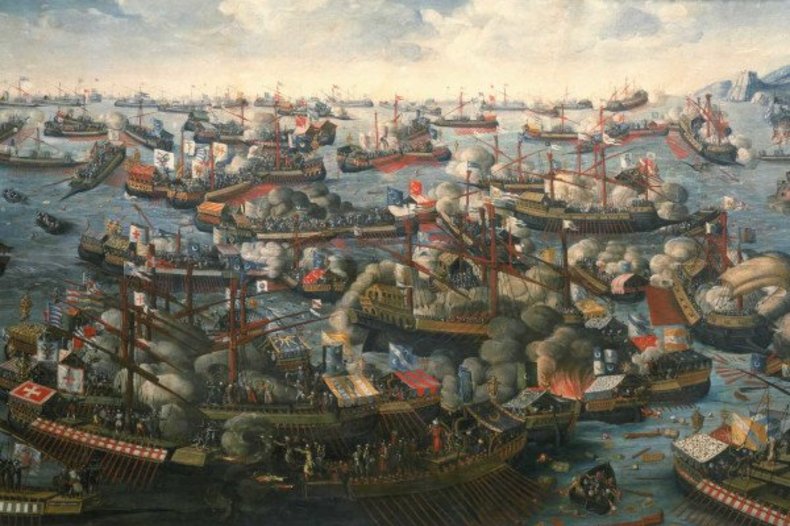
The Battle of Lepanto, unknown artist, 16th century / © CC0/wikimedia/National Maritime Museum
Les raisons d'y croire :
- In response to the Pope's appeal, the whole of Christendom consecrated itself in a special way to the Virgin Mary, by praying the rosary. The highly improbable outcome turned into a resounding victory for the Christian fleet through providential circumstances, and all the protagonists recognised the occurrence of a divine intervention.
This was the case not only for the Christians, but also for the Turks, who noted in their chronicles that "the Imperial Fleet had confronted the fleet of the impure Infidels, and God's will turned against it".
- After this battle, the feast of Our Lady of Victory, unique to the Western Church, was instituted by Saint Pius V to commemorate the great victory of Lepanto. Twenty-one years later, Pope Gregory XIII gave this feast its current name of Our Lady of the Rosary, commemorated every first Sunday in October in all churches.
- The certainty of having been helped by the Virgin Mary led Christians to rely on her again during the other decisive battle that halted Muslim expansion on earth, in Vienna on September 12, 1683.
- Pope Clement XI extended the feast of Our Lady of the Rosary to the universal Church because of the new victory over the Turks won through the same intercession at Peterwardein on August 5, 1716.
Synthèse :
From 1299 onwards, the Ottoman Empire, which saw itself as the armed wing of Islam, began to expand in Anatolia, and then in all directions: In 1453, the Turks under Mehmed the Conqueror succeeded in taking Constantinople, putting an end to the Byzantine Empire, which had lasted for over a thousand years; in 1517, the Ottoman Empire conquered Egypt and Syria under the reign of Selim I; in 1526, the Battle of Mohács in Hungary led to the death of the Hungarian King Louis II and the start of Ottoman expansion in Central Europe (which tended to spread westwards towards Rome). Nothing seemed able to stop this battle-hardened and numerically superior army. But in 1529 and 1532, Suleiman was defeated first in Vienna, then in Malta, which he tried to take in 1565. In 1570, however, he succeeded in taking Cyprus from the Republic of Venice after a brutal conquest. More than 20,000 inhabitants of Nicosia were put to death, something that moved European Catholics, especially as raids multiplied along the coasts of Italy, Sardinia, Corsica, Spain and Provence, kidnapping women and children, who were then sold on slave markets and forcibly converted.
The Ottoman Empire was building up its military fleet at this time, in an attempt to establish itself throughout the Mediterranean, to the detriment of the Italian cities. It succeeded for a time. It was at this point that Pope Pius V intervened and, gathering nations in a "Holy League", mobilised and succeeded in forming an alliance between Spain, Venice, the Papal States, the Republic of Genoa, the Duchy of Savoy, the Order of St John of Jerusalem and a number of other powers - without France, who had been shamefully allied with Istanbul in 1536, and without England, who had turned a deaf ear to the Pope's appeals.
The battle promised to be difficult, huge and decisive: The fleet of the Holy League consisted in 206 galleys and 6 galleasses (from the Republic of Venice, the Spanish Empire, the Republic of Genoa, the Papal States, the Order of Saint Stephen and the Grand Duchy of Tuscany, the Duchy of Savoy, the Knights of Malta and some private ships), carrying 28,750 soldiers and 40,000 sailors and galley slaves, against the Ottoman fleet, which had a total of 208 galleys supported by 64 fustes and 53 galleots with 50,000 sailors and 27,000 soldiers.
At this decisive moment, the Pope, a former Dominican, entrusted himself in a special way to the Virgin Mary and asked all Catholics to recite the Rosary every day for the success of Christian arms, the defeat of the infidels and the end of the Muslim threat. This request followed on from the Mother of God's promise to Saint Dominic: "Whatever you ask for through my rosary, you will obtain". A great wave of prayer swept across Europe.
Against all expectations, thanks to an improbable combination of circumstances that enabled the Turks to be blocked in the Straits of Corinth and a sudden drop in the wind that prevented them from manoeuvring, the Christian victory was total and would become a major event. On the Ottoman side, 170 galleys were sunk or captured, 30,000 men were killed or wounded, 3,000 were taken prisoner and more than 15,000 Christian galley slaves were freed. Only around thirty galleys, as well as a dozen fustes and galiotes, escaped the debacle by fleeing to Lepanto with a crew of 12,000 men. On the Christian side, the material losses were slight in terms of ships, but significant in human terms: only 10 galleys were sunk and all the captured galleys were recaptured, with the exception of one; on the other hand, the human toll was heavy: 8,000 men died during the fighting and 21,000 others were wounded, many of whom did not survive being transported to Corfu.
"It is worth recalling the prediction made by the Holy Pope on the evening of the great day of October 7, 1571. From six o'clock in the morning until the approach of night, the battle was going on between the Christian and Muslim fleets. Suddenly the pontiff, moved by a divine impulse, looked fixedly up at the sky; he stood in silence for a few moments, then, turning to those present he declared: "Let us give thanks to God! Victory is for the Christians!" Soon the news reached Rome, and it was not long before the whole of Christendom knew that a pope had once again saved Europe. The defeat at Lepanto dealt the Ottoman power a blow from which it has never recovered; the era of its decline dates from that famous day," Dom Prosper Guéranger wrote in L’Année liturgique (1841-1866).
The following year, the Pope instituted October 7 as the feast of Our Lady of Victory, which later became Our Lady of the Rosary, in gratitude for Mary's intervention with God in securing the victory.
This defeat was of considerable importance to the Ottomans, who had not lost a major naval battle since the 15th century. It was mourned by them as an act of divine will, with contemporary chronicles recalling that "the Imperial Fleet had confronted the fleet of the impure Infidels, and the will of God turned against it". This was also the Christians' sentiment: they gave heartfelt thanks to the Virgin Mary, who was again successfully prayed to in the battles that followed, in Vienna and elsewhere, to counter Muslim expansion.
Some historians consider this naval battle to be the most important in terms of its consequences since that of Actium (31 BC), where Octavian (Augustus) defeated Mark Antony and Cleopatra, putting an end of the Roman civil wars.
Olivier Bonnassies
Au-delà des raisons d'y croire :
It is always a good and wise idea to entrust or consecrate onself to the Virgin Mary, in imitation of Christ who placed himself entirely in her hands as a little babe.
Aller plus loin :
Article "The Battle that Saved the Christian West" by Christopher Check published in This Rock magazine in March 2007 (Volume 18 number 3)
En savoir plus :Lepanto by G. K. Chesterton, Ignatius Press; First Edition (March 1, 2004)
- The Galleys at Lepanto by Jack Beeching (Scribner, 1983 – out of print; used copies available online)
- Ten Dates Every Catholic Should Know by Diane Moczar (Sophia Institute, 2006)
Lepanto by G. K. Chesterton, Ignatius Press; First Edition (March 1, 2004)
LES RAISONS DE LA SEMAINE
Marie ,
Les apparitions et interventions mariales ,
Des miracles étonnants
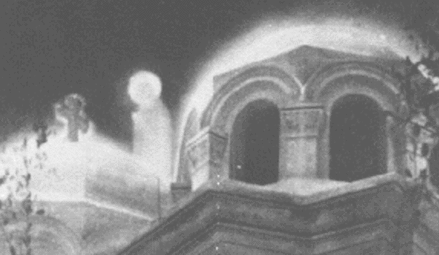
Zeitoun : ils sont des centaines de milliers à avoir vu la Vierge en Égypte
Les apparitions et interventions mariales
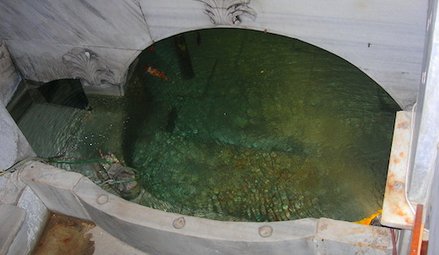
La source vivifiante de Constantinople
Les apparitions et interventions mariales ,
Guérisons miraculeuses

La Vierge Marie guérit un adolescent, avant de lui apparaître des dizaines de fois
Les apparitions et interventions mariales ,
Histoires providentielles
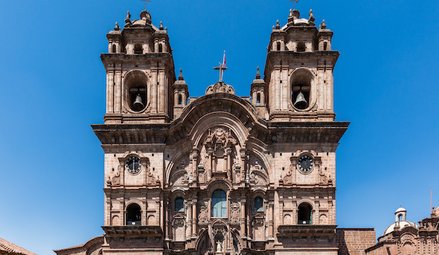
La Vierge Marie délivre les chrétiens de la cité de Cuzco
Les apparitions et interventions mariales ,
Guérisons miraculeuses
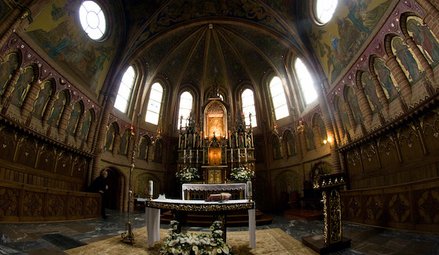
Les apparitions de Gietrzwald en secours à une minorité persécutée
Les apparitions et interventions mariales
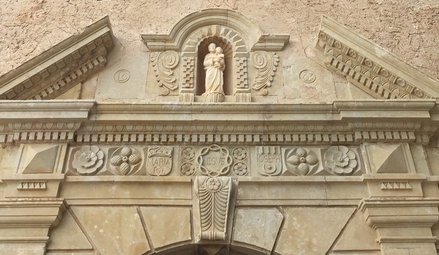
Les apparitions de saint Joseph au Bessillon
Les apparitions et interventions mariales ,
Stigmates
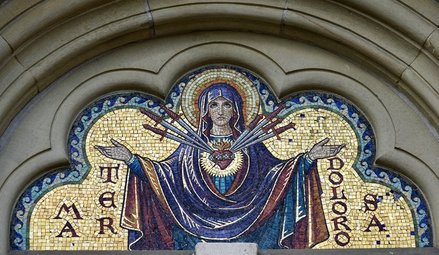
Luz Amparo et les apparitions de l’Escurial
Les apparitions et interventions mariales
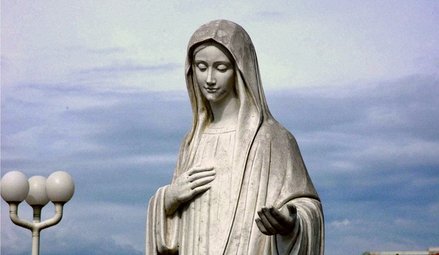
Les extraordinaires apparitions de Medjugorje et leur impact mondial
Les apparitions et interventions mariales
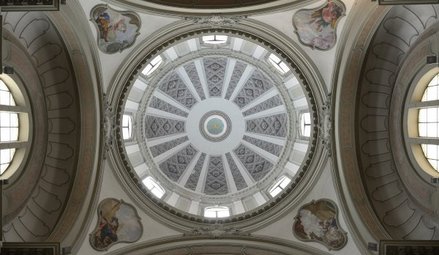
La Rosa Mystica de Montichiari
Les apparitions et interventions mariales
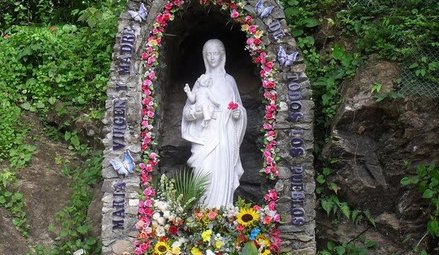
Maria Esperanza et Notre Dame Réconciliatrice des Peuples
Les apparitions et interventions mariales
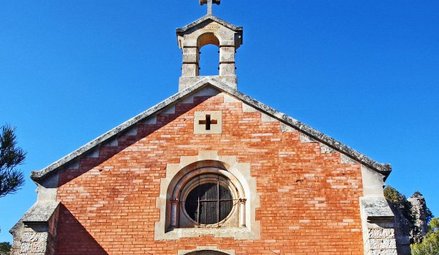
Cotignac, premières apparitions modernes de l’histoire
Les apparitions et interventions mariales ,
Guérisons miraculeuses

L’apparition silencieuse de Knock Mhuire
Les apparitions et interventions mariales ,
Histoires providentielles
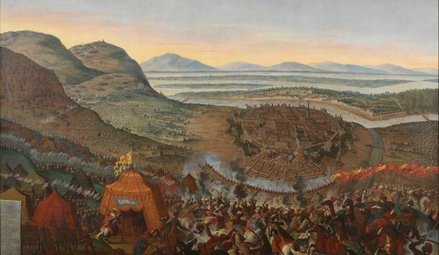
Le Saint Nom de Marie et la victoire décisive de Vienne
Les apparitions et interventions mariales ,
Guérisons miraculeuses
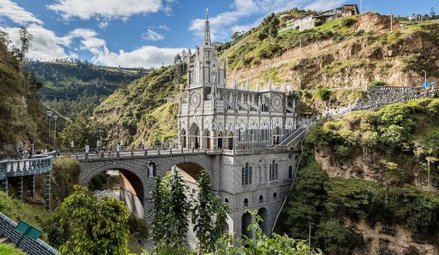
Le ciel touche la terre en Colombie : Las Lajas
Les apparitions et interventions mariales
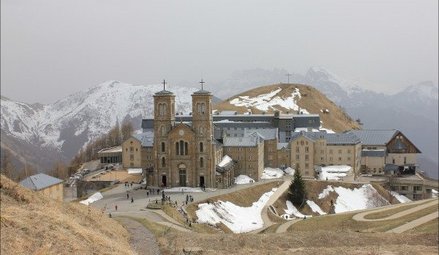
A la Salette, Marie pleure près des bergers
Les apparitions et interventions mariales
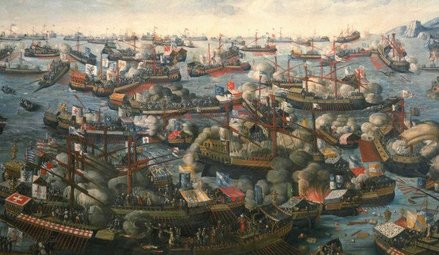
La victoire de Lépante et la fête de Notre-Dame du Rosaire
Les apparitions et interventions mariales
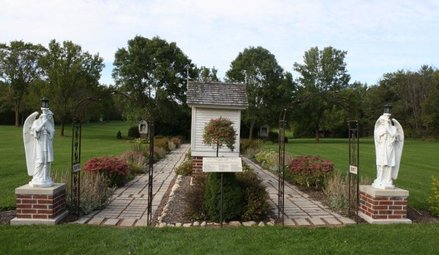
La Vierge Marie dans le Wisconsin : « Heureux ceux qui croient sans avoir vu »
Les apparitions et interventions mariales
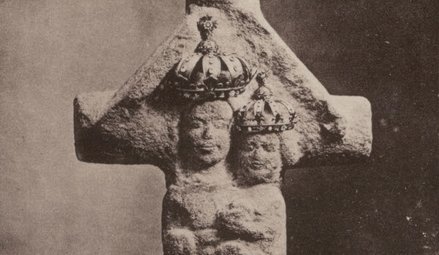
Notre Dame de Nazareth à Plancoët
Les apparitions et interventions mariales ,
Histoires providentielles
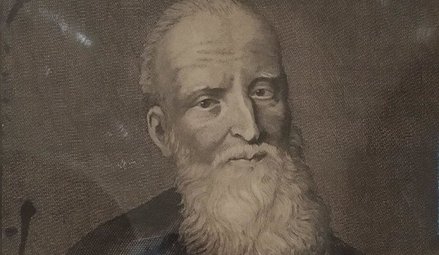
Les apparitions au frère Fiacre
Les apparitions et interventions mariales
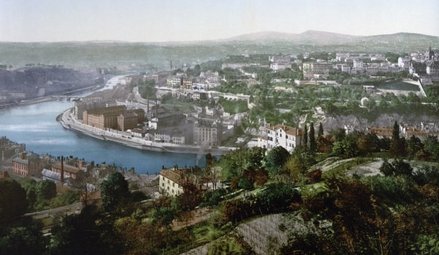
Marie « Mère abandonnée » apparaît dans un quartier populaire de Lyon
Les apparitions et interventions mariales
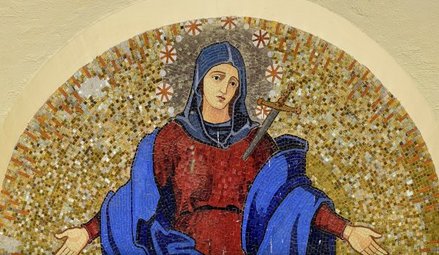
La Vierge Marie prophétise les massacres au Rwanda
Les apparitions et interventions mariales
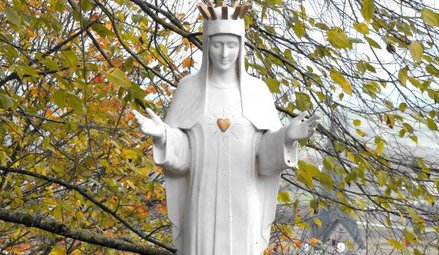
Les trente-trois apparitions de la Vierge Marie à Beauraing
Les apparitions et interventions mariales
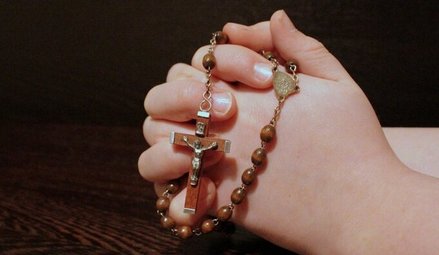
« Une Belle Dame » vient au secours de la France à l'Île Bouchard
Les apparitions et interventions mariales ,
Histoires providentielles
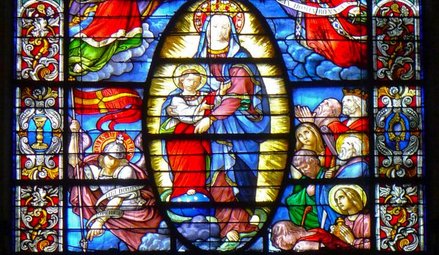
« Consacre ta paroisse au cœur immaculée de Marie »
Les apparitions et interventions mariales
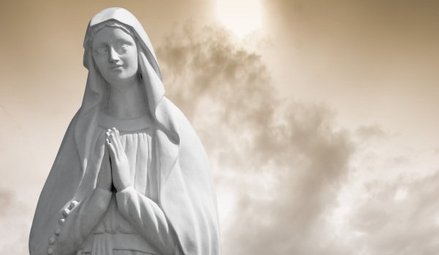
Apparitions et message de la Vierge Marie à Myrna
Les apparitions et interventions mariales ,
Guérisons miraculeuses
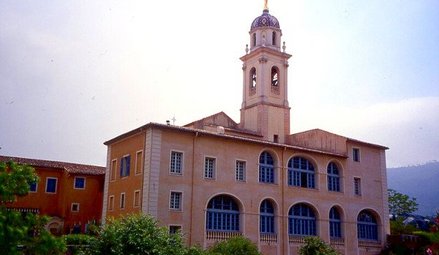
La Madone de Laghet
Les apparitions et interventions mariales

Les confidences du Ciel à la bergère du Laus
Les apparitions et interventions mariales
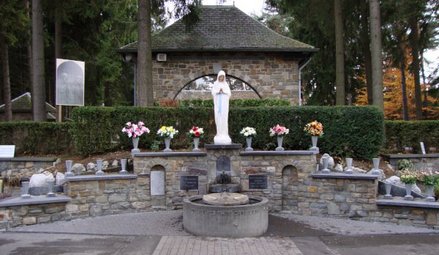
La « Vierge des pauvres » apparaît à huit reprises à Banneux
Les apparitions et interventions mariales ,
Histoires providentielles
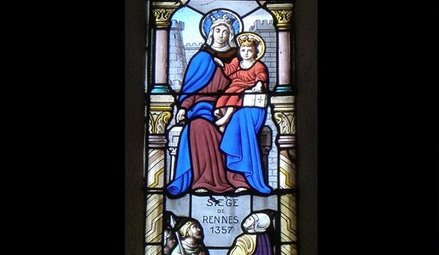
Notre Dame des Vertus sauve la ville de Rennes
Les apparitions et interventions mariales
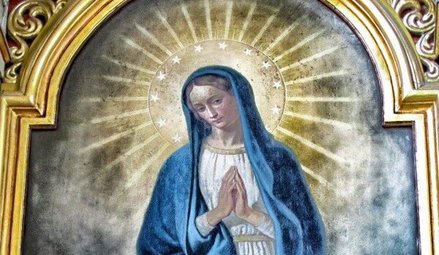
Marie fait arrêter l’épidémie de peste au mont Berico
Les apparitions et interventions mariales
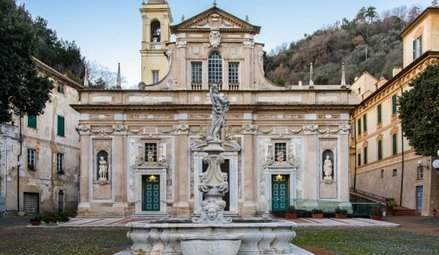
Savone, 1536 : la naissance d’un sanctuaire
Les apparitions et interventions mariales

Seuca : l’appel de la « Reine de lumière » en Roumanie
Marie ,
Les apparitions et interventions mariales ,
Des miracles étonnants

Zeitoun: cientos de miles de personas han visto a la Virgen María en Egipto
Les apparitions et interventions mariales

La fuente vivificante de Constantinopla
Marie ,
Les apparitions et interventions mariales ,
Des miracles étonnants

In the 1960s, the Virgin Mary appeared in Egypt before hundreds of thousands of witnesses
Les apparitions et interventions mariales

The Life-giving Font of Constantinople
Les apparitions et interventions mariales ,
Guérisons miraculeuses

The Virgin Mary heals a teenager, then appears to him dozens of times
Les apparitions et interventions mariales ,
Guérisons miraculeuses
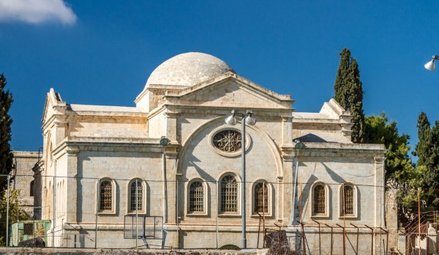
Zeitoun, un miracle de deux années
Les apparitions et interventions mariales
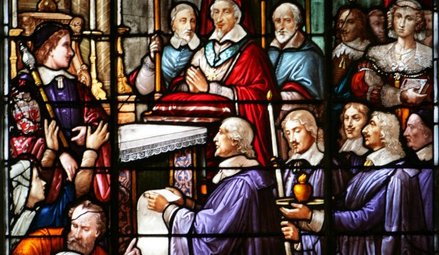
Le « vœu des échevins », ou la dévotion mariale des Lyonnais
Les apparitions et interventions mariales ,
Guérisons miraculeuses

La Virgen María cura a un adolescente y se le aparece decenas de veces
Les apparitions et interventions mariales ,
Histoires providentielles

La Virgen María salva a los cristianos de la ciudad de Cuzco
Les apparitions et interventions mariales
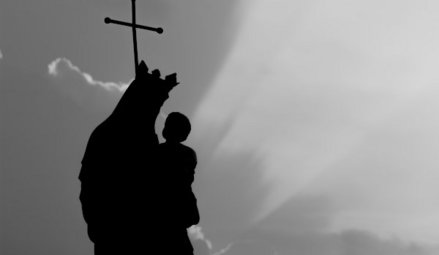
La Vierge apparaît et prophétise en Ukraine depuis le XIXe siècle
Marie ,
Les apparitions et interventions mariales ,
Des miracles étonnants

Zeitoun: centinaia di migliaia di persone hanno visto la Vergine Maria in Egitto
Les apparitions et interventions mariales

La sorgente vivificante di Costantinopoli
Les apparitions et interventions mariales
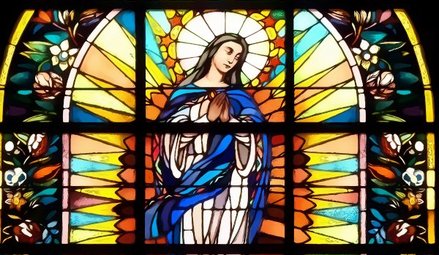
Marie répond au vœu des Polonais
Les apparitions et interventions mariales ,
Guérisons miraculeuses

La Vergine Maria guarisce un adolescente e poi gli appare decine di volte
Les apparitions et interventions mariales ,
Histoires providentielles

The Virgin Mary delivers besieged Christians in Cusco, Peru
Les apparitions et interventions mariales
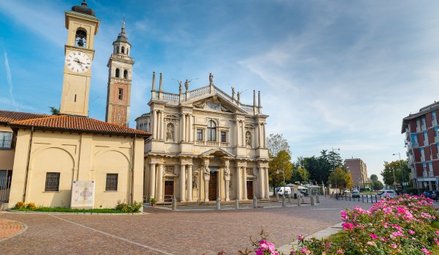
Notre Dame des miracles guérit un paralytique à Saronno
Les apparitions et interventions mariales ,
Guérisons miraculeuses

Las apariciones de Gietrzwald en auxilio de una minoría perseguida en Polonia
Les apparitions et interventions mariales
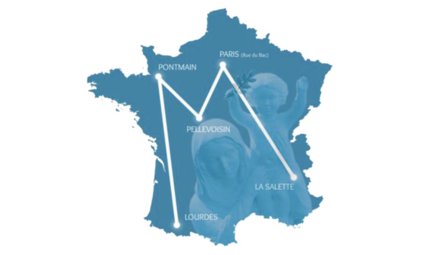
Le « M » que Marie a tracé sur la France sera rappelé le 26 mai prochain
Les apparitions et interventions mariales ,
Histoires providentielles

La Vergine Maria libera i cristiani della città di Cuzco
Les apparitions et interventions mariales

Las apariciones de San José en el monte Bessillon
Les apparitions et interventions mariales ,
Guérisons miraculeuses

Gietrzwald apparitions: heavenly help to a persecuted minority
Les apparitions et interventions mariales

Saint Joseph’s apparitions in Cotignac, France (1660)
Les apparitions et interventions mariales ,
Stigmates

Luz Amparo and the El Escorial apparitions
Les apparitions et interventions mariales

The extraordinary apparitions of Medjugorje and their worldwide impact
Les apparitions et interventions mariales ,
Stigmates

Luz Amparo y las apariciones de El Escorial
Les apparitions et interventions mariales

Las extraordinarias apariciones de Medjugorje y su repercusión mundial
Les apparitions et interventions mariales ,
Guérisons miraculeuses

Le apparizioni di Gietrzwald in aiuto di una minoranza perseguitata
Les apparitions et interventions mariales

Le apparizioni di San Giuseppe sul monte Bessillon
Les apparitions et interventions mariales

Our Lady "Rosa Mystica" of Montichiari
Les apparitions et interventions mariales ,
Stigmates

Luz Amparo e le apparizioni di El Escorial
Les apparitions et interventions mariales
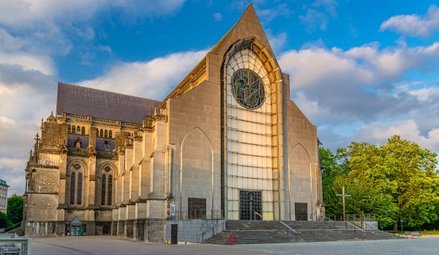
Apparition, prophétie et guérisons de la Vierge Marie dans le Nord de la France
Les apparitions et interventions mariales

La Rosa Mística de Montichiari
Les apparitions et interventions mariales

Le straordinarie apparizioni di Medjugorje e il loro impatto mondiale
Les apparitions et interventions mariales

María Esperanza y Nuestra Señora Reconciliadora de todos los Pueblos
Les apparitions et interventions mariales

Cotignac, las primeras apariciones modernas de la historia
Les apparitions et interventions mariales

La "Rosa Mistica" di Montichiari
Les apparitions et interventions mariales ,
Les anges et leurs manifestations
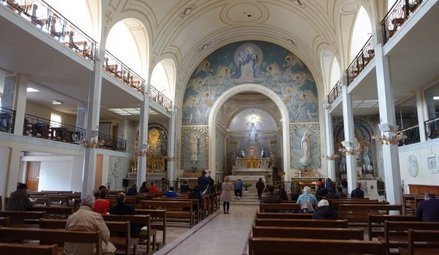
La nuit extraordinaire de sœur Labouré
Les apparitions et interventions mariales

Maria Esperanza and Our Lady, Reconciler of Peoples
Les apparitions et interventions mariales

Cotignac: the first apparitions of the Modern Era (1519)
Les apparitions et interventions mariales

Maria Esperanza e Maria Vergine e Madre, Riconciliatrice dei Popoli
Les apparitions et interventions mariales ,
Guérisons miraculeuses

The silent apparition of Knock Mhuire in Ireland (1879)
Les apparitions et interventions mariales

Cotignac, le prime apparizioni moderne della storia
Les apparitions et interventions mariales ,
Histoires providentielles
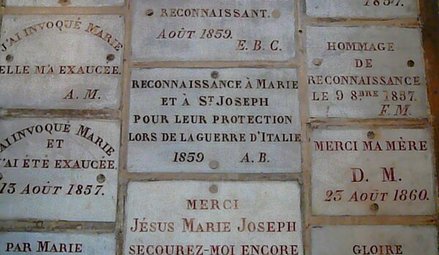
Les 37 000 prières exaucées, gravées dans le marbre d’une basilique parisienne
Les apparitions et interventions mariales
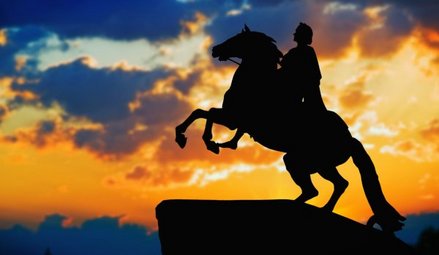
Notre Dame des Neiges au secours des soldats catholiques
Les apparitions et interventions mariales ,
Guérisons miraculeuses

La silenciosa aparición de Knock Mhuire
Les apparitions et interventions mariales ,
Guérisons miraculeuses

L'apparizione silenziosa di Knock Mhuire
Les apparitions et interventions mariales ,
Histoires providentielles

El Santo Nombre de María y la victoria decisiva en Viena
Les apparitions et interventions mariales ,
Guérisons miraculeuses

El cielo toca la tierra en Colombia: Las Lajas
Les apparitions et interventions mariales

En La Salette, María llora junto a los pastores
Les apparitions et interventions mariales ,
Histoires providentielles

The Holy Name of Mary and the major victory of Vienna (1683)
Les apparitions et interventions mariales ,
Guérisons miraculeuses

Heaven and earth meet in Colombia: the Las Lajas shrine (1754)
Les apparitions et interventions mariales

At La Salette, Mary wept in front of the shepherds
Les apparitions et interventions mariales
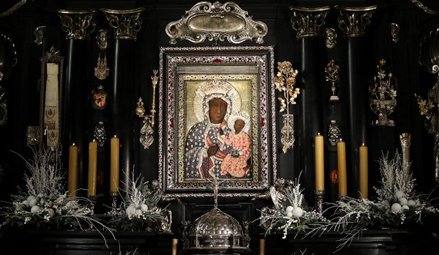
Czestochowa, l’âme de la Pologne
Les apparitions et interventions mariales ,
Histoires providentielles

Il Santo Nome di Maria e la vittoria decisiva a Vienna
Les apparitions et interventions mariales ,
Guérisons miraculeuses

Il cielo tocca la terra in Colombia: Las Lajas
Les apparitions et interventions mariales
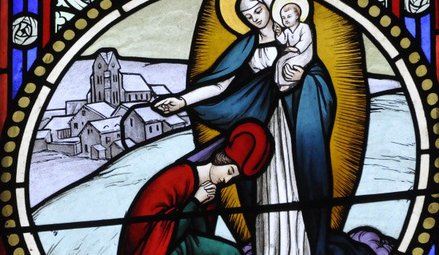
Notre Dame de l’Agenouillée
Les apparitions et interventions mariales

A La Salette, Maria piange davanti ai pastori
Les apparitions et interventions mariales

The victory of Lepanto and the feast of Our Lady of the Rosary
Les apparitions et interventions mariales

Our Lady of Champion, Wisconsin: the first and only approved apparition of Mary in the US (1859)
Les apparitions et interventions mariales

La victoria de Lepanto y la fiesta de Nuestra Señora del Rosario
Les apparitions et interventions mariales

La Virgen María en Wisconsin: "Bienaventurados los que creen sin haber visto"
Les apparitions et interventions mariales

Nuestra Señora de Nazaret en Plancoët
Les apparitions et interventions mariales

Notre Dame de Nazareth in Plancoët
Les apparitions et interventions mariales

La vittoria di Lepanto e la festa della Madonna del Rosario
Les apparitions et interventions mariales

La Vergine Maria nel Wisconsin: "Beati coloro che credono pur non avendo visto"
Les apparitions et interventions mariales ,
Histoires providentielles

The apparitions to Brother Fiacre
Les apparitions et interventions mariales ,
Histoires providentielles

Apariciones al Hermano Fiacre
Les apparitions et interventions mariales

María "Madre Abandonada" aparece en un barrio obrero de Lyon
Les apparitions et interventions mariales

Mary "Abandoned Mother" appears in a working-class district of Lyon, France
Les apparitions et interventions mariales

Nostra Signora di Nazaret a Plancoët
Les apparitions et interventions mariales ,
Histoires providentielles

Le apparizioni a fratel Fiacre
Les apparitions et interventions mariales

Maria "Madre abbandonata" appare in un quartiere operaio di Lione
Les apparitions et interventions mariales

The Virgin Mary prophesied the 1994 Rwandan genocide
Les apparitions et interventions mariales

Face à la Gestapo, elles soutiennent qu’elles ont vu la Vierge Marie
Les apparitions et interventions mariales

The thirty-three apparitions of the Virgin Mary in Beauraing
Les apparitions et interventions mariales

La Virgen María profetiza masacres en Ruanda
Les apparitions et interventions mariales

Las treinta y tres apariciones de la Virgen María en Beauraing
Les apparitions et interventions mariales

"Una Bella Señora" acude al rescate de Francia en Île Bouchard
Les apparitions et interventions mariales ,
Histoires providentielles

"Consagra tu parroquia al Inmaculado Corazón de María".
Les apparitions et interventions mariales

The Virgin Mary comes to France's rescue by appearing at L'Île-Bouchard
Les apparitions et interventions mariales ,
Histoires providentielles

"Consecrate your parish to the Immaculate Heart of Mary".
Les apparitions et interventions mariales
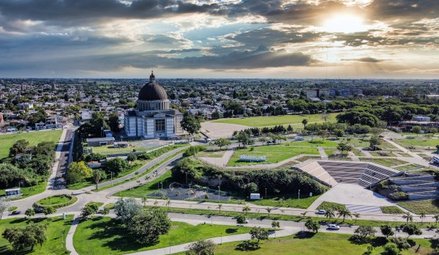
San Nicolas : lorsque Marie visite l’Argentine
Les apparitions et interventions mariales

Our Lady of Soufanieh's apparition and messages to Myrna Nazzour
Les apparitions et interventions mariales

La Vergine Maria profetizza i massacri in Ruanda
Les apparitions et interventions mariales

Le trentatré apparizioni della Vergine Maria a Beauraing
Les apparitions et interventions mariales

Apariciones y mensaje de la Virgen María en Myrna
Les apparitions et interventions mariales ,
Guérisons miraculeuses

La Madonna de Laghet
Les apparitions et interventions mariales ,
Guérisons miraculeuses

Our Lady of Laghet
Les apparitions et interventions mariales

"Une Belle Dame" viene in soccorso della Francia sull'Île Bouchard
Les apparitions et interventions mariales

Heaven confides in a shepherdess of Le Laus
Les apparitions et interventions mariales ,
Histoires providentielles

"Consacra la tua parrocchia al Cuore Immacolato di Maria"
Les apparitions et interventions mariales

Le apparizioni e il messaggio della Vergine Maria a Myrna
Les apparitions et interventions mariales ,
Guérisons miraculeuses

La Madonna di Laghet
Les apparitions et interventions mariales
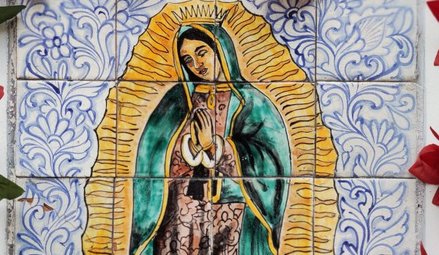
La Vierge Marie porte la Bonne Nouvelle aux Indiens du Mexique
Les apparitions et interventions mariales

Las confidencias del Cielo a la pastora de Le Laus
Les apparitions et interventions mariales

"Our Lady of the Poor" appears eight times in Banneux
Les apparitions et interventions mariales

Le confidenze del Cielo alla pastorella di Laus
Les apparitions et interventions mariales

La "Virgen de los Pobres" se aparece ocho veces en Banneux
Les apparitions et interventions mariales
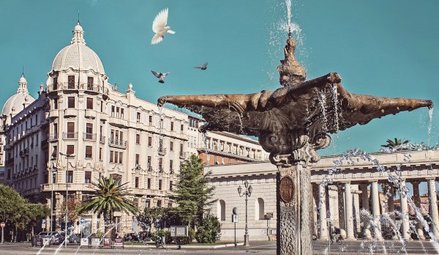
Plus de mille ans que Marie agit pour les hommes à Foggia
Les apparitions et interventions mariales
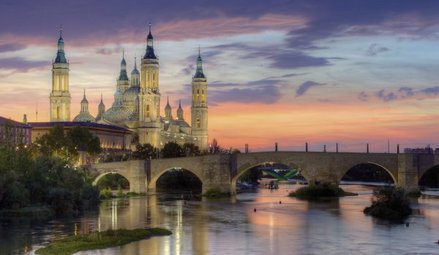
Notre Dame du Pilier vient redonner courage à l’apôtre Jacques à Saragosse
Les apparitions et interventions mariales

La "Vergine dei poveri" appare otto volte a Banneux
Les apparitions et interventions mariales ,
Histoires providentielles

Our Lady of Virtues saves the city of Rennes in Brittany
Les apparitions et interventions mariales ,
Histoires providentielles

Nuestra Señora de las Virtudes salva la ciudad de Rennes
Les apparitions et interventions mariales ,
Histoires providentielles

Nostra Signora delle Virtù salva la città di Rennes
Les apparitions et interventions mariales
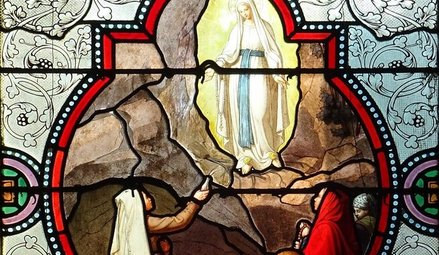
Les apparitions de Lourdes, d’authentiques expériences surnaturelles
Les apparitions et interventions mariales

Mary stops the plague epidemic at Mount Berico
Les apparitions et interventions mariales
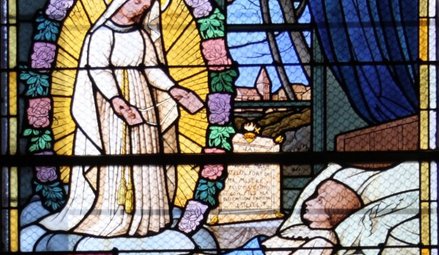
Les quinze apparitions de Notre Dame à Pellevoisin
Les apparitions et interventions mariales

María detiene la epidemia de peste en el Monte Berico
Les apparitions et interventions mariales

Savona: supernatural origin of the devotion to Our Lady of Mercy
Les apparitions et interventions mariales

Savona, 1536: el nacimiento de un santuario
Les apparitions et interventions mariales

Seuca: la llamada de la "Reina de la Luz" en Rumanía
Les apparitions et interventions mariales

Seuca, Romania: apparitions and pleas of the Virgin Mary, "Queen of Light"
Les apparitions et interventions mariales

Maria ferma l'epidemia di peste sul Monte Berico
Les apparitions et interventions mariales ,
Guérisons miraculeuses

Zeitoun, un milagro que dura dos años
Les apparitions et interventions mariales

El "voto de los concejales" o la devoción mariana de los lioneses
Les apparitions et interventions mariales

Savona, 1536: la nascita di un santuario
Les apparitions et interventions mariales

Seuca: l'appello della "Regina della Luce" in Romania
Les apparitions et interventions mariales ,
Guérisons miraculeuses

Zeitoun, a two-year miracle
Les apparitions et interventions mariales

The "Aldermen's Vow", or the Marian devotion of the people of Lyon
Les apparitions et interventions mariales

Notre-Dame de Treize-Pierres, en Aveyron
Les apparitions et interventions mariales ,
Guérisons miraculeuses

Zeitoun, un miracolo di due anni
Les apparitions et interventions mariales








